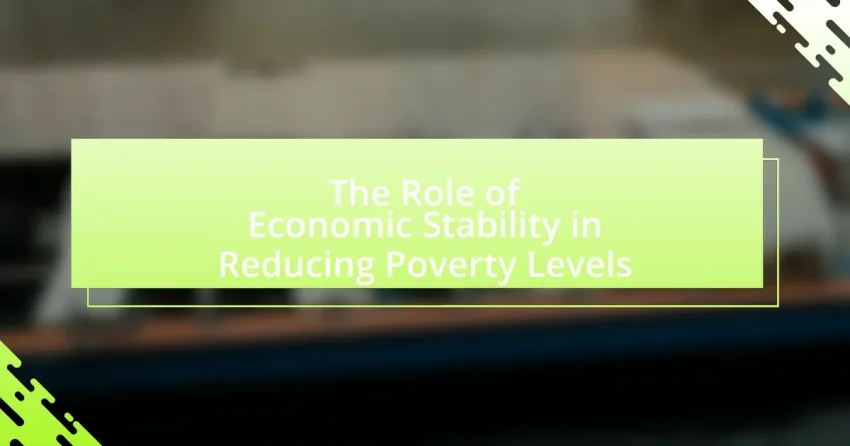Economic stability is a critical factor in reducing poverty levels, as it creates an environment that promotes job creation, investment, and sustainable growth. This article explores the definition of economic stability in the context of poverty reduction, key indicators that signify stability, and the mechanisms through which stability impacts employment and social welfare. It also…
Economic Stability
Welcome to the ‘Economic Stability’ category, your go-to resource for understanding the fundamentals of how economies thrive or falter. Here, you’ll find a collection of articles that explore key concepts, indicators, and factors that contribute to economic stability. From inflation and employment rates to fiscal policies and global trade, each piece provides insights into how these elements interact. Our intention is to make this complex subject matter digestible for everyone, regardless of background.
As you navigate through the articles, expect to deepen your knowledge about the importance of stability in economic health. You’ll learn about the roles of governments, central banks, and international organizations in promoting stability. Each article is designed to provoke thought and encourage discussion. Whether you’re a student, a professional, or simply curious, you will find valuable information to help you understand the intricacies of economic stability. Dive in and discover how these crucial elements shape our world!
The Role of International Aid in Promoting Economic Stability
International aid is a vital mechanism for promoting economic stability in developing countries by providing financial resources, technical assistance, and capacity building. The article examines how international aid contributes to economic stability through infrastructure development, healthcare, and education, highlighting its effectiveness during crises and its role in enhancing governance. It discusses the types of aid…
The Role of Economic Stability in Promoting Social Cohesion
Economic stability is a fundamental factor in promoting social cohesion, as it fosters trust and reduces inequality within communities. The article explores how stable economic conditions lead to consistent employment opportunities, enhance social relationships, and contribute to reduced crime rates. Key factors linking economic stability to social cohesion include income equality, access to social services,…
The Long-Term Effects of Economic Stability on Future Generations
The article examines the long-term effects of economic stability on future generations, highlighting its role in fostering sustained growth, reducing poverty, and enhancing educational opportunities. It discusses how stable economies lead to consistent job creation, improved quality of life, and better access to essential services such as healthcare and education. Additionally, the article explores the…
The Influence of Economic Stability on Food Security Across Nations
The article examines the critical relationship between economic stability and food security across nations, highlighting how stable economies enhance food availability, accessibility, and utilization. It discusses the impact of economic conditions on food production, supply chains, and purchasing power, emphasizing the role of government policies and international trade in shaping food security outcomes. Additionally, the…
The Relationship Between Economic Stability and Crime Rates in Urban Areas
The article examines the relationship between economic stability and crime rates in urban areas, highlighting that economic stability is inversely related to crime rates. It discusses how stable economic conditions, characterized by low unemployment and higher income levels, correlate with lower crime rates, while economic instability often leads to increased criminal activity. The article presents…
The Interplay Between Economic Stability and Housing Affordability
The article examines the relationship between economic stability and housing affordability, highlighting how economic conditions influence income levels, employment rates, and interest rates, which in turn affect individuals’ ability to secure housing. It discusses key indicators of economic stability, such as low inflation and steady GDP growth, and explains how housing affordability is measured through…
The Importance of Economic Stability for Sustainable Development Goals
Economic stability is a fundamental component for achieving Sustainable Development Goals (SDGs), as it creates an environment that encourages growth, investment, and social progress. Stable economies attract foreign direct investment, which is vital for funding essential infrastructure and social programs aimed at poverty reduction, education, and health. Key indicators of economic stability include low inflation…
Economic Stability and Its Impact on Employment Rates Globally
Economic stability is defined as a condition where an economy experiences consistent growth, low inflation, and low unemployment, which is essential for fostering consumer and business confidence, encouraging investment, and promoting sustainable employment levels. This article explores the significance of economic stability on employment rates globally, examining key indicators such as GDP growth, inflation, and…
Economic Stability as a Predictor of Life Satisfaction in Various Cultures
Economic stability is defined as a condition where an economy experiences consistent growth, low inflation, and low unemployment, which significantly influences life satisfaction across various cultures. The article explores how economic stability correlates with life satisfaction, highlighting key indicators such as GDP growth and unemployment rates, and examining cultural differences in the perception of economic…









